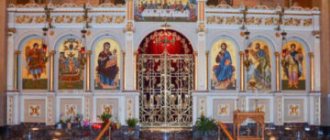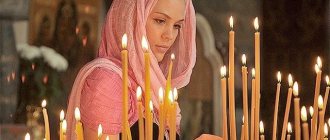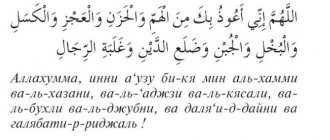I am an Orthodox Christian, and my husband adheres to Islam. In this regard, we both had to figure out how in what situations the religion of each of us relates to representatives of another faith. In this material I will talk about such an important issue as visits to Christian churches by Muslims. I will cover this topic from both sides, that is, from the positions of both Orthodoxy and Islam.
Second opinion
Another part of the scientists is of the opinion that entering Orthodox churches for a Muslim is makrooh, that is, an undesirable action. This opinion is held by the Hanbalis, which they explain for various reasons. One of these reasons is the presence of images there. As Sheikh al-Islam ibn Taymiyya explained in “Fatwa al-Kubra”, the majority of scholars of the Hanbali madhhab agree that it is undesirable for Muslims to enter Orthodox churches precisely because of the presence of images in them, and recognized this opinion as correct and did not doubt it correctness.
The Hanbalis provided a number of other evidences. It was mentioned that, as reported by Ibn Abbas, the Prophet Muhammad ﷺ “saw the images in the house, so he did not enter.” A message from Imam Bukhari from Ibn Abbas is also mentioned, which tells how the Prophet of Allah ﷺ, having once seen an image in the Kaaba, did not enter the House until, by his order, all the images were washed away.
There is also a message from Ibn Umar, who told how the angel Jibril promised the Prophet of Allah Muhammad ﷺ that he would visit him, but the angel was delayed, and the Prophet Muhammad ﷺ, without waiting for him, went out into the street, where he met Jibril. And then the angel Jibril told him that angels do not enter houses where there are dogs or images.
If there is no need for a true believer to enter a church or a house with images, then this should not be done - in this case, you need to know that this action will be undesirable. The fact that such an action would be makrooh is indicated by the fact that both the angels and the Prophet ﷺ did not want to enter the house in which there were images.
If an action is undesirable, it may become haraam if the Muslim man's or Muslim woman's attendance at church results in any harm. A true believer cannot agree with Christians in their prayers to the son of God or the wife of God, in their polytheism.
The fact that Muslims should better not enter Orthodox churches, since there are images there, was also mentioned by the freedman Umara Aslam, telling the case when, upon the arrival of Umar ibn al-Khattab in Sham, a treat was prepared for him by one of the local Christians, and he invited those who arrived to his place, but Umar refused, explaining that “... we do not enter your churches because of the images there.”
Islam and Christianity according to theologians
According to Muslim imams, Christian priests, and ordinary people, our religions have much in common. It is enough to give a few examples from the Koran or Hadith. The Holy Book of Muslims repeatedly mentions with great respect the “People of the Book,” that is, Christians. Because they are preachers of God's law and are humble before the Lord. According to the imams, this is exactly what true Muslims should be.
There is a well-known fact described in the book of the biography of the Prophet Muhammad, when his followers were protected and hidden from the pagans by Christians. They hid Muslims in their homes when they went to Ethiopia, saved them for a good cause, and sent them on their way with blessings.
If you delve into the essence of both religions, you will find a lot in common. Our religious beliefs are similar in that we believe in one God, and the rules for implementing his laws are almost the same. Remember the seven commandments of God, aren’t they written in the Holy Book of Muslims?
The only difference is how sacred prayers are performed and fasts are maintained, but this is largely due to religious traditions, historical and territorial attachments.
Third opinion
There is another opinion according to which true believers can visit Christian churches without any conditions - this opinion is shared by some Hanbalites, who are supported by Ibn Hazm. Proponents of this opinion provide a number of arguments in favor of their point of view. Umar set a condition for Jews and Christians, that is, people of the treaty, to expand their temples in such a way that Muslims, as well as travelers, could stop there for the night with their riding animals. They also mention the refusal to enter the Christian temple and taste the treat in Sham prepared for him by the Christians, telling Ali, who nevertheless entered the church and accepted the treat of the Christians.
The arguments presented are not convincing enough to establish a ban on Muslims visiting churches, since the entire burden of sin before Allah falls on those who draw these images and create statues installed in churches. The same people who will visit such places should explain the position of statues and images in Islam, but a Muslim is not obliged to immediately leave such a place.
Ibn Qudam is quoted as saying that it is not forbidden to enter a house where there is an image, but Muslims can refuse the offer to enter such a house - it is permissible. According to Imam Ahmad, one should not leave such a house after seeing images or statues in it; a Muslim is not obliged to do this, but he can reprimand the owner of the house and indicate that this should not be done.
You might be interested to know: Are Christians allowed to enter a mosque?
Muslims in an Orthodox church
Muslims are not prohibited from entering places of worship belonging to other religions, be it an Orthodox or Catholic church, a synagogue or a Buddhist building. Another thing is everyone’s personal desire or prohibitions related to prohibitions in the family. The most religious or orthodox representatives of the Muslim religion do not visit such buildings of their own free will.
- People of other faiths can enter a religious building of a different faith, there will be no sin in this, today the tourism business is widespread in many countries, people travel, get to know countries, and are interested in the life of other peoples.
- Perhaps the only condition under which it is worth thinking before entering the walls is service.
- If you enter a church during a service, then you, of your own free will, become a participant in the worship service of another cult. And here there may already be prohibitions.
- Inspecting the building from the inside for educational purposes is not prohibited, but being on duty can be interpreted differently.
However, everyone decides for themselves based on their own religious views and strength of faith.
Orthodox Christians are also not prohibited from visiting synagogues and mosques, even during services. Many mosques offer guided tours during prayer times. You just need to behave appropriately and be dressed appropriately.
Is it possible for a Muslim to enter a church and light candles?
In its fatwas, the Standing Committee states that it is unacceptable for a Muslim to enter a Christian temple to demonstrate his leniency towards Christianity.
But if he is going to go to a Christian temple in order to make a call to Islam for Christians, but is not going to pray, take part in the worship of Christians or their religious rites, much less light candles, perform a funeral service or be baptized, and there is no fear of that that he may be influenced by the beliefs of Christians, their traditions and customs, then in this case it will be allowed to go there.
How and where is prayer performed?
- Namaz can be performed both in the mosque and at home, both alone and surrounded by many people. You need to come to the mosque if, having heard the call of the imam, a Muslim is not far from it. If the mosque is far away, and it is difficult for a Muslim to get to it due to illness, bad weather or other good reasons, then you can pray at home or at work.
- Having prepared to read the surahs of the Koran and personal prayers (dua), having performed ablution and cleansed clothes and places of prayer, a Muslim must also purify his thoughts, and only then proceed to prayer, the call (adhan) to which is given by the imam.
- The person praying must stand on the prayer rug, on which the qibla is depicted, and turn to the Creator, reading the prayer prescribed by the time of day.
Can be read at home or in temple
Is it possible to perform namaz in church?
In connection with the question of whether Muslims can enter an Orthodox church to perform namaz, the famous hadith is often cited as an example that it is possible for a Muslim to pray everywhere, since the entire earth is a mosque, with the exception of baths and cemeteries. This hadith is generalized, but its essence is that you can go and pray in any place, excluding those places where Shariah has prohibited it. Such places forbidden for prayer include baths, cemeteries, places for driving camels, those places where any people were subjected to the punishment of the Almighty, and those places where uncleanness occurs. If there is a grave in the mosque, then it is also forbidden to perform namaz in it.
There is disagreement among scholars about whether Muslims can enter and pray in non-Muslim places of worship - synagogues and churches. The words of Imam ibn Qudam are quoted as saying that “There is no problem in performing namaz in a clean church.” This position was held by Sa'id ibn Abdul-Aziz, Umar ibn Abdul-Aziz, Hasan al-Basri, al-Awza'i and al-Sha'bi, but Malik and ibn Abbas categorically disagreed with this opinion, who argued that Muslims are not allowed to perform namaz or enter the church due to the presence of images in the church.
A number of scholars are of the opinion that it is permissible to enter and perform prayer in a Christian temple or synagogue, since even the Prophet Muhammad ﷺ performed prayer in the Kaaba, although there were images there. The Prophet of Allah ﷺ also wrote the following words: “Wherever prayer finds you, then perform it, truly this place will be a mosque.”
Summarizing all of the above, we can conclude that Muslims should not go to church or be in it unless absolutely necessary.
Summary
- Orthodoxy allows Muslims to visit their temples both for tourism purposes and for prayer, worship, seeking help, and so on.
- Only church sacraments and the second part of the liturgy are forbidden for those professing Islam.
- Islam clearly does not allow people to come to Orthodox churches for the purpose of praying to the Christian God, worshiping icons, or participating in rituals.
- Otherwise, different currents of Islam adhere to different positions - some prohibit visiting temples even without the purpose of worship, some allow it in cases of strong need, and some do not see this as a sin for Muslims and even allow prayers to be performed in a church building.
When using materials from thebestvideo.ru, a link to the source is required.
How should a Muslim dress during prayer?
- Before starting prayer, you should check whether the Muslim's body is covered in accordance with established rules. For men, open areas on the body are not allowed, starting from the knees and ending with the shoulders (shoulders must also be covered). A woman's body should be completely covered, only her face and palms remain open.
- Offering prayer without following these rules is unacceptable either in the mosque or at home. It is also prohibited to wear transparent or tight-fitting clothing, as well as clothing that depicts people or animals.
How to make up for missed prayers?
- Missed morning prayers are performed after the sun rises.
- When praying in a mosque, the next prayer is performed first, then the missed one, and when praying alone, vice versa.
- If there is not enough time for the prayers to be read one by one, the prayer that is about to end is performed first, otherwise it will be missed, and then the missed ones.
- Having missed all the prayers for a valid reason, a Muslim must perform them one by one, trying to do this until the time allotted for night prayer expires.
- Having missed the fivefold prayer, it can be made up during the next day, while taking turns reading the current prayer first, then the missed one.
- Having missed the night prayer, it should be said immediately as soon as the Muslim wakes up, before the morning prayer.
Reading is important for men and women
Is it possible to perform namaz more than 5 times a day?
The fivefold prayer is established by Allah and this rule cannot be violated. But you can read additional prayers:
- Tahajjud is a prayer that is recited at home before the pre-dawn prayer begins.
- Witr - this prayer can be used to end the reading of Tahajjud.
- The prayer of the spirit is read after the sun rises, but before the start of Zuhr prayer.
- Tarawih is a congregational prayer in a mosque during Ramadan.
- Istikhara is a prayer that is read in order to make the right decision, to make the right choice.
Useful articles on the site:
- Muslim signs for sneezing
- Islam and Islam - are they the same thing or not?
- Why Muslim women cannot go to the cemetery
- Best Muslim Girl Names by Alphabet










